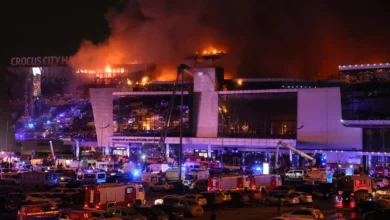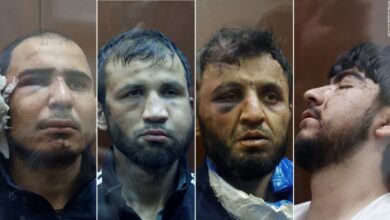Over the past 30 years, American novelist Nelson DeMille has written 15 novels all of which were best sellers and many of which were translated into several languages, including Arabic. In his novels, DeMille mixes fact and fiction to create thrillers. He has depicted the Arab world in his writings both before and after 11 September, 2001.
In his 2000 novel The Lion’s Game (Grand Central Publishing), DeMille portrayed Asad Khalil, a Libyan who joins a Islamic militant group. The book’s sequal, TheLion, is set to be released 8 June, 2010.
Islamic militancy also features in DeMille’s other novels Wild Fire (Warner Books, 2006) and Night Fall (Hachette, 2007). Al-Masry Al-Youm is the first Arabic newspaper to interview DeMille and have a peek at his latest book prior to publication.
Al-Masry Al-Youm: The Lion’s Game, Night Fall, and Wild Fire, all deal with themes of the Arab world, terrorism, and conspiracy theory. Why do you focus on these things?
Nelson DeMille: Many American action and suspense writers of popular fiction have chosen the subject of terrorism for their novels. One reason is that with the end of the Cold War, something needed to be substituted in action/adventure novels, and the most obvious subject for popular action fiction is the war on terrorism. Also, people buy these books and popular novelists write what sells. We don’t create the market. We respond to it.
Al-Masry: Before 9/11 you published TheLion’s Game, which portrays an Arab terrorist hijacking an airplane and killing everyone. Was that a prediction?
DeMille: I did a lot of research for The Lion’s Game and interviewed many people in the FBI, the Joint Terrorism Task Force, and a few people in the CIA. They all knew the World Trade Center would be attacked again–the first attack was February 1993–but they were not certain how or when. So, yes, I did believe it would happen again, based on this information.
Al-Masry: In The Lion’s Game, you dig deeply into the reasons behind Asad’s actions. Will you do the same in the sequel?
DeMille: In The Lion’s Game, I wanted to show the motivations of the terrorist, Asad Khalil, a Libyan. I wanted to make him understandable to the reader. His family was killed in the American bombing of Tripoli on 15 April, 1986, and thus he is seeking revenge. I wanted to demonstrate the circle of attacks and counterattacks that drive this conflict. In The Lion, we see less of Asad’s motivations, but we still understand them. The book is set post-9/11 so that event hangs over the book and makes the story different from The Lion’s Game in many ways.
Al-Masry: How do you get your information regarding Arab or Muslim characters?
DeMille: Mostly through the FBI, but also from reading many books about Arab culture and Islam. Most of the Muslims I know are Pakistani, and they are, of course, different from Arab Muslims culturally, but share the same faith, and I was able to use what I learned [from them] in my novels.
Al-Masry: It seems that most of those characters reflect negative point of view. Do you personally have the same feeling towards Arab countries or does it just happen that you portray some bad characters from the area?
DeMille: Obviously, most of the Arab characters I show in my novels are the bad guys–not the law-abiding and peaceful Muslim Arabs that make up most of the population. I do have an Arab Palestinian as a policeman in The Lion’s Game, and he reappears in The Lion.
Al-Masry: Wild Fire also unveils conspiracy theories related to Arabs. Do you believe in conspiracy theories in general?
DeMille: I personally do not believe in any conspiracy theories–not in the JFK assassination, TWA 800, the World Trade Center attack and so forth. But conspiracy is a crucial element in this type of fiction, so I do include it, but I also argue against it in my books.
Al-Masry: You started with detective novels and even the well known character John Corey started as NYDP officer in the beginning before you transformed him into terrorist hunter. What is line between these worlds? Does Corey’s shift reflect reality?
DeMille: Some of my books have a military background as a result of my time as a US Army officer. Some of my books have a Cold War/intelligence theme, and some are police oriented. The police in America, active duty and retired, play a major role in counterterrorism within the US, and I show that through my character John Corey, who is of both worlds now. This is based on fact–former police officers hired by the FBI to serve as the first line of defense in the war on terrorism. I have a friend who was a New York City police detective and is now working for the FBI in counterterrorism in New York City, as does my character John Corey.
Al-Masry: In real life, Libya has turned around its policy toward the US, yet Asad Khalil, the Libyan terrorist, is the main character of your latest book, despite the current status of Libyan-American relations.
DeMille: I do say in The Lion that Libya is not a major problem for the US, but Asad Khalil is still on a mission of personal revenge. In The Lion, he has broken his contact with Libyan Intelligence, and is now suspected of working for Al-Qaeda. World events change quickly and writing a novel takes almost two years, so I have to anticipate events and shifting alliances, but still try to keep the story and the politics and the diplomatic situation current and believable. This is a challenge for any novelist.
Al-Masry: With all these bestselling novels, only one turned to be a Hollywood blockbuster. Why are your novels far away from Hollywood?
DeMille: The General’s Daughter (Warner Books, 1992) was the only Hollywood feature film, but Mayday (Grand Central Publishing, 1998) and Word of Honor (Grand Central Publishing, 1998) were made into TV movies. Almost all my books have been bought or optioned by Hollywood, and they are in various stages of development. My books are sometimes complex and do not lend themselves easily to adaption into a screenplay. I don’t write for Hollywood, but Hollywood likes my stories. Making them into movies, however, is not so easy.
Translated from the Arabic Edition.




